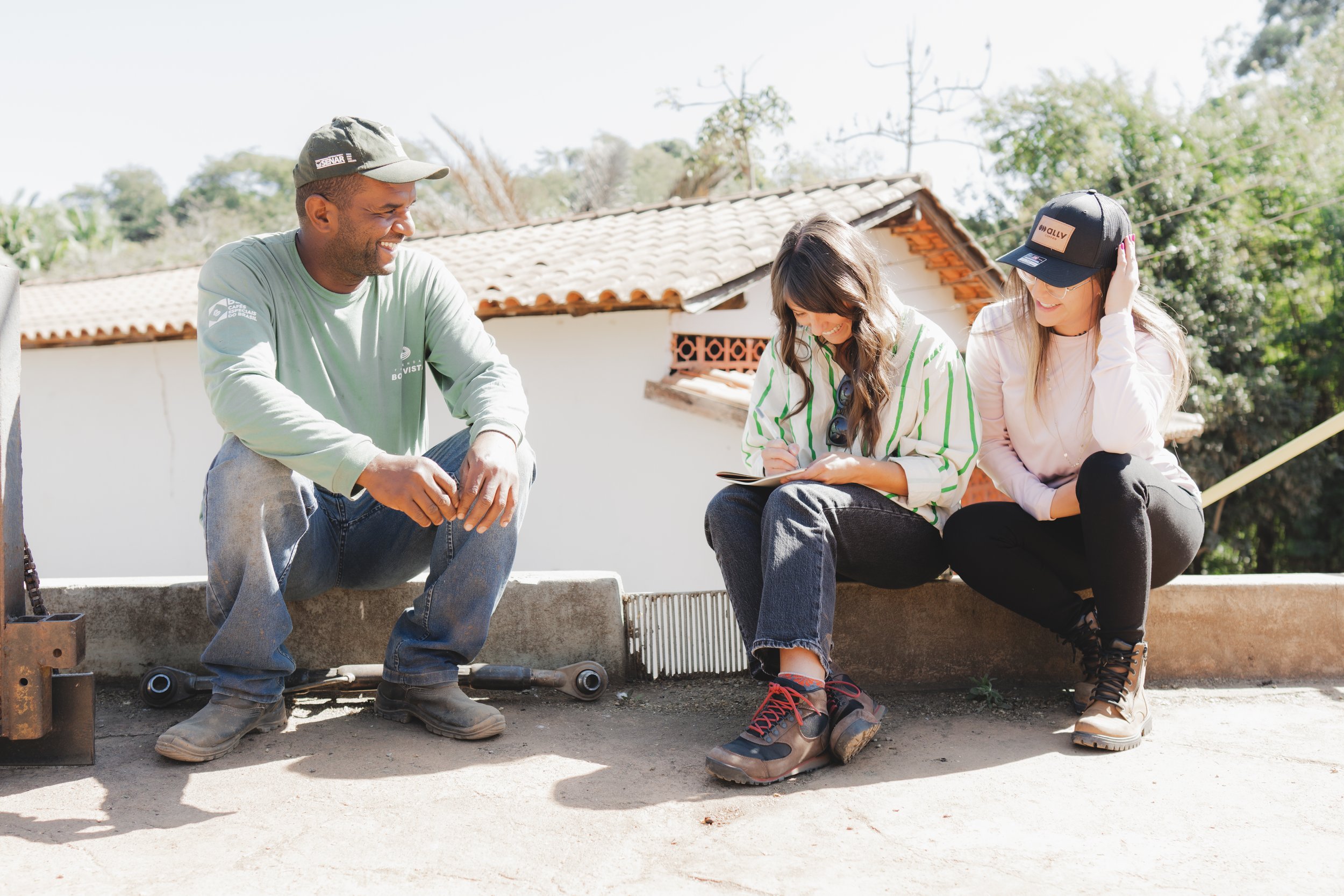Living Income Pricing - Brazil
Brazil is both the largest exporter of coffee worldwide—producing around 25% of the world’s supply of coffee—and also one of the largest volumes of coffee that Bellwether sells through our Green Coffee Marketplace every year.
As such, Brazil was a priority supply chain for us to implement our Living Income Pricing methodology. Living Income Pricing is a new pricing methodology that establishes origin‑specific minimum prices that farmers require in order to close the living income gap. This new pricing mechanism establishes minimum prices based on farmers’ livelihood needs and the cost of coffee production, rather than an outside market based on supply and demand. To establish a minimum price, Bellwether and its partners across the supply chain collect data on cost of production, land size, and productivity level, which is analyzed over a full harvest cycle. We then overlay this data with a Living Income Benchmark established for a particular coffee growing region to determine the minimum price that needs to be paid.
Defining Living Income Benchmark
A Living Income Benchmark is defined as the annual income required to afford a decent standard of living for all members of a household—once costs of producing coffee are covered. A decent standard of living includes: a nutritious, culturally‑appropriate diet; decent housing based on local needs and expectations; the cost of other basic needs, like healthcare, transportation, clothing, and education; and minimum savings to withstand unexpected shocks and expenses.
To date, we have implemented Living Income Pricing across many of our supply chains, including in Latin America, but coffee production in Brazil is structured differently than any other country where we purchase coffee.
Coffee Production Structure of Brazil
Brazil is known for large estate, highly mechanized coffee production. The four farms in Minas Gerais that make up the Brazil Parceiros do Café are more than 300 hectares in size, producing nearly 9000 60 kg bags of coffee per year—that’s over 1.2 million pounds of coffee per year!
Prior to kicking off our own study, we looked to see what other resources had already been published. A recent study conducted by the Global Coffee Platform analyzed whether growers in Brazil earn a living income. The results of the study suggest that producers similar in size and production volume to the producers we work with in Brazil obtain good earnings from coffee production.
As we set out to implement Living Income Pricing in Brazil, our key question was based on how farms are structured in Brazil, who is most vulnerable in the coffee supply chain?
Brazil marked a new milestone for our Living Income Pricing methodology at Bellwether where we set out on a fact finding mission to look further upstream our supply chains to ensure that not just farm owners but farm employees are able to earn a living income through our coffee sourcing.
Living Income Study
We initially kicked off our Living Income Pricing project in Brazil in November 2022 by visiting each farm, introducing Bellwether, our electric roaster, and our goals behind our Living Income Pricing. We know that what we are doing is not (currently) the norm for the industry, and it takes finding the right partners to be able to build trust and transparently move this work forward.
We identified four farms that met both our coffee quality needs and had the openness to launch a living income study alongside us. When we revisited one of the farms in July 2023, one of the estate managers joked with Grayson Caldwell, Bellwether’s Director of Sustainability & Impact, and said, “I never thought I would see you again—I thought you were initially just coming to take pictures of the farm like everyone else.”
Our team spent two weeks on the ground, traversing the state of Minas Gerais to visit each of the four farms that make up Bellwether’s custom lot of coffees. We, alongside our importing partner Ally, interviewed both full-time and seasonal workers across each farm.
We were focused on finding how much workers were paid, if they derived their entire income from coffee, their work schedule, additional benefits they receive from the farm, and what they wanted our customers to know about coffee production in Brazil.
After conducting the interviews, our team met with the administrative teams of the estates and verified the results of the interviews compared to the financials and salary books of each farm.
We then set to work on analyzing the data that we received on worker pay and how this compared to each farms’ costs of production and the living wage that the workers needed to receive.
Moving Forward: The Path to Impact
After analyzing the data, we found the following:
Employees were paid on average R$2077 per month which is well above the 2023 R$1320 monthly minimum wage
The average monthly salary fell 27% below the R$2621 monthly living wage across the regions of Minas Gerais where we purchase coffee
To close the living income gap, Bellwether would need to pay a 10¢ per pound premium to seasonal and full-time workers across the four farms
And we did just that. Bellwether added a 10¢ premium to our 2024 Brazil contracts—this additional money was funneled directly back to all of the farm workers across the four farms that make up the Brazil Parceiros blend.
This work was important for our farm partners, one of whom said: “No one has ever asked us if producers are paid a fair price. Certifications come to audit us but never with the intention of paying a higher price.” At Bellwether, we are on a mission to do that—pay a higher price that enables coffee producers and farm laborers to earn a living income—and we will continue to work towards implementing our Living Income Pricing methodology across each of our supply chains moving forward.


